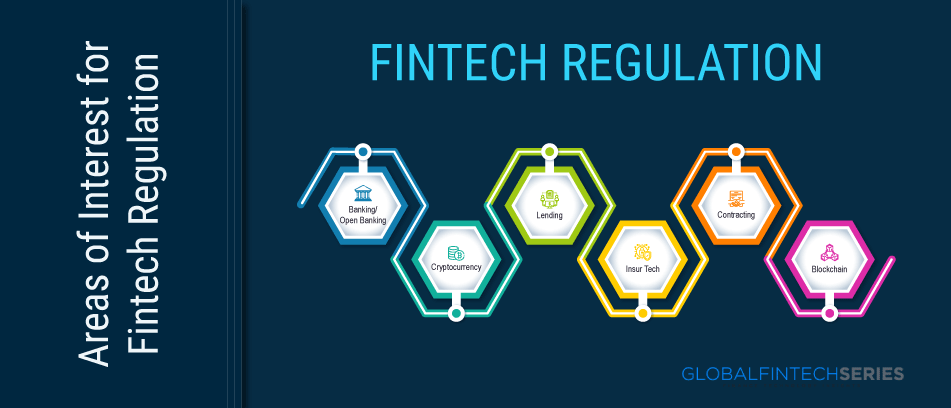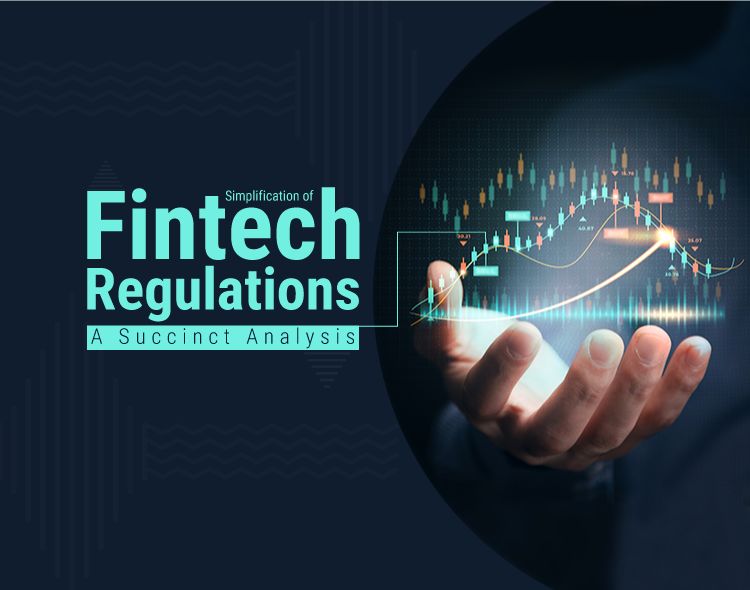Introduction
As the financial technology industry grows in importance to the economies and national security of all countries, the regulatory landscapes of those countries may change as well. Industry experience and subject expertise are essential parameters to comprehend today’s changing geopolitical and ESG landscapes.

The country-specific regulatory contexts on long-term fintech potential and threats in 2023 and beyond. This blog will give you a fair behind at all relevant fintech regulations, especially in the context of The United States.
Latest Read: AI Dynamics In Financial Services- WEF
Exclusive Fintech Insights From Industry Experts
Tom Bell, CEO of Money As A Service
 “True embedded finance, like Maast, is an ecosystem that encompasses payment acceptance, business checking, card issuing, and more. Each day we navigate a myriad of cross-disciplinary regulations. The bad guys are getting smarter. We must protect customers from data security, privacy, and fraud threats while also complying with GDPR, SEC, anti-money laundering, and other banking regulations. Managing this alone can be a daunting task for SaaS providers. Maast helps ERPs, marketplaces, independent software vendors (ISVs), and other SaaS business platforms become a onestop shop for business owners by embedding financial solutions in their platform, under their brand. We do the heavy lifting with compliance and risk management so our partners can deliver a superior experience and focus on what they do best helping their business owners run their businesses better.”
“True embedded finance, like Maast, is an ecosystem that encompasses payment acceptance, business checking, card issuing, and more. Each day we navigate a myriad of cross-disciplinary regulations. The bad guys are getting smarter. We must protect customers from data security, privacy, and fraud threats while also complying with GDPR, SEC, anti-money laundering, and other banking regulations. Managing this alone can be a daunting task for SaaS providers. Maast helps ERPs, marketplaces, independent software vendors (ISVs), and other SaaS business platforms become a onestop shop for business owners by embedding financial solutions in their platform, under their brand. We do the heavy lifting with compliance and risk management so our partners can deliver a superior experience and focus on what they do best helping their business owners run their businesses better.”
Alex Zeltcer, CEO nSure.ai
 The very essence of Fintech hinges on trust and reliability. The act of transferring funds in this digital landscape necessitates a network interwoven with trust among various entities. It’s essential to recognize that this network is not reliant on traditional physical currency like bills or coins, but rather on data and the protocols governed by regulatory frameworks. These regulations empower someone sitting in one corner of the world to instantaneously transfer funds across borders, a feat once considered inconceivable. This ability is a testament to the foundation of trust cultivated by regulations. However, there are instances where regulations are misused or misapplied. For example, crypto exchanges are required to do KYC on transactions that are $3,000 or more, but many start with KYC at the first dollar. That creates friction in onboarding customers and jeopardizes their ability to grow their business. So, regulations are necessary, but they are often misused.
The very essence of Fintech hinges on trust and reliability. The act of transferring funds in this digital landscape necessitates a network interwoven with trust among various entities. It’s essential to recognize that this network is not reliant on traditional physical currency like bills or coins, but rather on data and the protocols governed by regulatory frameworks. These regulations empower someone sitting in one corner of the world to instantaneously transfer funds across borders, a feat once considered inconceivable. This ability is a testament to the foundation of trust cultivated by regulations. However, there are instances where regulations are misused or misapplied. For example, crypto exchanges are required to do KYC on transactions that are $3,000 or more, but many start with KYC at the first dollar. That creates friction in onboarding customers and jeopardizes their ability to grow their business. So, regulations are necessary, but they are often misused.
Martin Zych, CEO and co-founder of Jirav
 “It is up to the CFO to ensure the financial health of their organization through planning and budgeting, integrated financial planning, management and performance reporting, and forecasting and modeling. But another important aspect of keeping an organization financially healthy is ensuring compliance with financial regulations and standards. There are a number of regulations and standards that can impact fintech companies such as those related to consumer data protection, anti-money laundering, securities and trading violations, and credit and lending, to name a few. Taking internal factors like staffing, expenses, and departmental allocations into account are crucial for successful financial management, sure, but fintech companies that neglect to also weigh external factors such as regulations will only be making decisions based on part of the financial picture.”
“It is up to the CFO to ensure the financial health of their organization through planning and budgeting, integrated financial planning, management and performance reporting, and forecasting and modeling. But another important aspect of keeping an organization financially healthy is ensuring compliance with financial regulations and standards. There are a number of regulations and standards that can impact fintech companies such as those related to consumer data protection, anti-money laundering, securities and trading violations, and credit and lending, to name a few. Taking internal factors like staffing, expenses, and departmental allocations into account are crucial for successful financial management, sure, but fintech companies that neglect to also weigh external factors such as regulations will only be making decisions based on part of the financial picture.”
Latest: Harnessing The Power Of AP Automation For Businesses
Who Are The Fintech Regulators?
Officials in the Federal Government Who Oversee the Banking Sector
Fintech companies that do banking activities are subject to regulation by one of four federal prudential agencies. While their areas of expertise may vary, each organization has taken steps to welcome Fintech.
- All state-chartered banks that are not part of the Federal Reserve System are primarily regulated by the Federal Deposit Insurance Corporation (“FDIC”). The FDIC is now implementing a major upgrade to the bank call report that makes use of Fintech and AI-based solutions.
- National banks and federal savings associations are chartered and regulated by the Office of the Comptroller of the Currency (“OCC”). In order to create a regulatory environment that encourages and rewards responsible innovation, the OCC has opened an Office of Innovation.
- The Federal Reserve Board of Governors (“FRB”) regulates and supervises all depository institutions holding corporations and all state-chartered banks that are members of the Federal Reserve System. The FRB remains committed to encouraging responsible innovation, particularly in the areas of facilitating real-time payments, researching the potential dangers and benefits of digital currencies, and promoting the application of artificial intelligence to the financial services industry.
- Credit unions, both federal and state, are governed by the National Credit Union Administration (“NCUA”). The NCUA has become more cautious in its approach to Fintech.
Also Read: Best-suited AP Automation Tool For Your Business.
Other Federal Authorities
- Mortgage lenders, debt collectors, and student loan servicers are just some of the non-bank financial services businesses that fall under the CFPB’s purview of supervision. The CFPB has extensive regulatory writing and law enforcement powers.
- Many federal consumer financial protection rules that have an effect on Fintech are supervised and enforced by the Consumer Financial Protection Bureau (“CFPB”).
- The objective of the Federal Trade Commission (“FTC”) is to increase competition and safeguard consumers from fraud and other misleading business practices. The FTC has the power to regulate non-bank Fintech companies that offer banking alternatives such as lending, payments, and cryptocurrency.
- Investors are safeguarded by the Securities and Exchange Commission (“SEC”), the Commodity Futures Trading Commission (“CFTC”), and the Financial Industry Regulatory Authority (“FINRA”), all of which oversee the activities and operations of cryptocurrency exchanges and carry out federal enforcement of securities and commodities trading laws relevant to Fintech offerings.
- The Financial Crimes Enforcement Network (“FinCEN”) is an agency that monitors financial institutions and issues regulations for their anti-money laundering (“AML”) compliance programs in order to combat money laundering, terrorist financing, and other financial crimes. The FinCEN Innovation Initiative encourages the use of cutting-edge technological solutions to the problem of anti-money laundering (AML) compliance.
Read This: Data-Driven Insights: Statistical Analysis for Video Marketing Success
Scenario In The United States: A Succinct Analysis
It’s worth noting that the United States is notably devoid of systemically significant fintech companies. Numerous financial technology businesses in the United States are competing with established financial institutions. Less regulatory urgency has likely resulted from this ecosystem’s diversity. In addition, US financial services regulation has often inspired new developments in the fintech sector.
Debit interchange (the price a card issuer receives to assist manage the system and guard against fraud) was limited down to a low level for banks with over US$10 billion in assets by the Durbin Amendment, which was included in the Dodd-Frank bill that was passed during the global financial crisis. As a result, financial institutions below the threshold (even innovative fintechs) can maintain lucrative debit interchange.
As a result of the significant income earned, US fintech companies were able to raise substantial amounts of venture capital and invest in other areas of expansion, fueling the industry’s growth. We believe that U.S. regulators do not perceive fintechs as a systemic danger and that new laws for the financial services industry will continue to generate business in many different areas.
This may be due, in part, to the fact that regulators have been hesitant to overregulate the fintech industry due to the market’s strong support for increased financial inclusion. Customers who have been neglected for a long time are now being served by a slew of new fintech companies.
It is plausible, and even likely, that the beneficial effects of increased access to financial services make US regulators less likely to adopt tight rules on the sector, notwithstanding the importance of regulation to a well-functioning financial services ecosystem.
It’s possible that this is also the case in economies outside of the United States, where fintechs are helping to expand access to banking services without posing a systemic risk.
The topic of privacy in cryptography is receiving more research and development. Despite the fact that blockchain information is connected to fictitious account numbers, it is increasingly simple to connect a transaction history to a specific individual. Particularly for consumers living under repressive political regimes, finding the optimal balance between user privacy and governmental control is of utmost importance.
Importantly, the crypto industry’s adoption and regulation will be affected by the ever-changing geopolitical context. Many people in the world don’t have access to robust financial markets, but decentralized crypto protocols could be a huge improvement. In a world that is becoming more and more multipolar, the likelihood that crypto will serve as the basis for a shift away from a Western-centric financial system by some countries is growing.
Much is discussed in the U.S., let’s take a snapshot of other countries as well. Financial technology growth engines like Brazil, India, Indonesia, and China each have their own prescription for innovation. Existing financial products in all four markets are of low quality and have huge margins because of monopolistic behavior, state-owned firms, banks, and payment systems that have taken advantage of that framework.
This synergy can be ideal for startups that want to disrupt products and take market share from entrenched industries. However, a flourishing fintech sector also necessitates an innovative regulatory framework. The breadth of possible regulatory postures is highlighted by comparing China to Brazil, India, and Indonesia.
Read latest Unveiling The Indispensability: 5 Crucial Financial Reports For Your Company’s Success
[To share your insights with us, please write to pghosh@itechseries.com]
